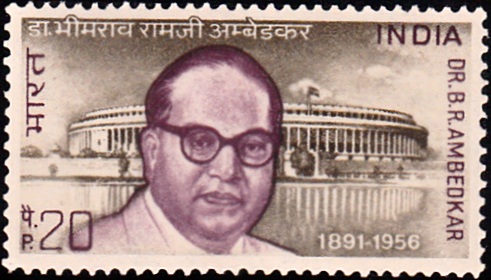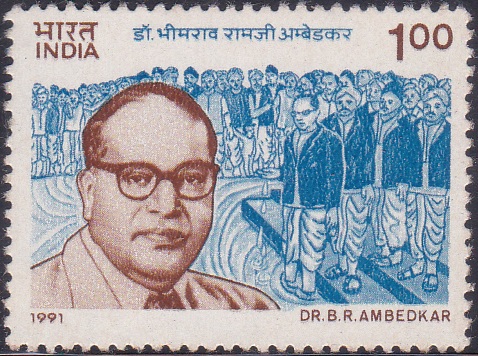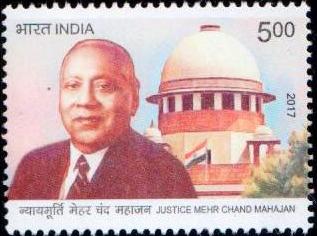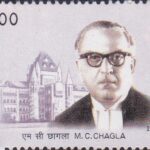
Dr. B. R. Ambedkar 1966
A commemorative postage stamp on the 75th Birth Anniversary of Baba Saheb Ambedkar, 1st Minister of Law and Justice of India :
 Issued by India
Issued by India
Issued on Apr 14, 1966
Issued for : His 75th birth anniversary falls on the 14th April 1966 and the P & T Department takes this opportunity to honour this great Indian by issuing a commemorative stamp.
Type : Stamp, Mint Condition
Colour : Plum
Denomination : 15 Paisa
Overall Size : 3.3 X 2.46 cms.
Printing Size : 2.99 X 2.1 cms.
Perforation : 13½ x 14
Watermark : Printed on unwatermarked paper
Number Printed : 20,00,000
Number per issue sheet : 54
Printing Process : Photogravure
Designed and Printed at : India Security Press
Name : Bhimrao Ramji Ambedkar [popularly known as Babasaheb]
Born on Apr 14, 1891 at Mhow, Central Provinces, British India [now in Madhya Pradesh]
Died on Dec 6, 1956 at Delhi, India
About :
- The gifted mind of Dr. B. R. Ambedkar would have shone forth in any epoch and in any society. He came on the Indian scene when the tide of socio-political revolution was sweeping the land and he took it at the flood. The accident of his birth as an ‘untouchable’ gave a touch of poetic justice to the role he played during India‘s transition from a colony to a republic.
- Ambedkar was born in a Mahar family on April 14, 1891 at Mhow. His father was a Subedar in the Mahar Regiment. As a child he was vary studious and painstaking having realised at an early age that a sound education was the only means of bettering his lot. He said later, ‘nobody can remove our grievances, as well as we can‘. After graduation, he went on a scholarship to the Columbia University at the age of 22. A thesis on Provincial Finance in British India which earned him a Doctorate in Philosophy capped his academic career at Columbia. He pursued his studies in Economics and Law at London and was eventually called to the Bar from Gray’s Inn.
- He returned to India in 1923 and started a campaign to remove the disabilities from which the Harijans were suffering. Politically, he stood for a united self-governing community of Indians with special constitutional safeguards for the depressed classes. He was a socialist, but socialism meant little to him without religious and social equality.
- Though it might have often appeared that Dr. Ambedkar took extreme positions on social and political matters, it is a tribute to his patriotism and erudition that Independent India decided to make use of his talents to consolidate the gains of freedom. As Minister of Law and Chairman of the Drafting Committee, Dr. Ambedkar played a leading part in the framing of the Indian Constitution. An authority on Constitutional Law, his influence on politics, social reform, education and religion has been fundamental.







